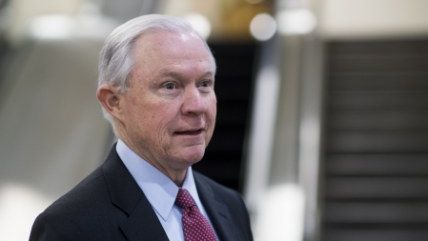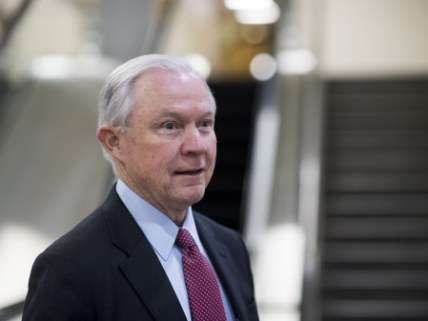Jeff Sessions, Fan of the Drug War and Asset Forfeiture, Confirmed as Attorney General
Sen. Rand Paul votes aye with rest of GOP.


By a vote of 52-47, senators this evening approved one of their own, Jeff Sessions (R-Alabama), to serve as the attorney general for President Donald Trump's administration. (The one missing vote from the Senate was Sessions himself.)
It's not a good outcome for civil libertarians, but his nomination was never really that surprising, given Trump's "law and order"-focused campaign.
Sessions is a well-known supporter of the drug war, and back in the 1990s wanted to execute dealers. He is a major supporter of civil asset forfeiture, the system by which police and prosecutors seize and keep citizens property based on suspicion of crimes, not their convictions. As Jacob Sullum has noted, Sessions conflates drug offenders with "violent criminals" and wants to treat them accordingly under the law. And based on his Senate testimony, it's not entirely clear whether he will call on the Department of Justice to enforce federal bans on marijuana even in states that have legalized or decriminalized it. He has also been concerned about reform agreements between the Department of Justice and local law enforcement agencies to correct bad behavior as potentially undermining officers.
Of interest in the vote, Sen. Rand Paul (R-Kentucky) gave Sessions a thumb's up. This matters because Paul voted against confirming the previous attorney general, Loretta Lynch, partly because of her support for civil asset forfeiture. Sessions is no different in his position in support of its use by police as a tool to fund and fight the drug war.
The vote was almost completely along party lines: GOP yes, Democrats no. The only senator to switch sides was Democratic Sen. Joe Manchin of West Virginia. He voted in favor of confirmation.
Reason on Jeff Sessions here. His confirmation doesn't mean that additional criminal justice reforms and protections can't happen, but it's probably going to be a tougher battle. The good news is that there's increasing bipartisan support for things like sentencing reform and tighter rules on asset forfeiture.


Show Comments (339)